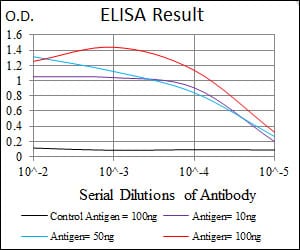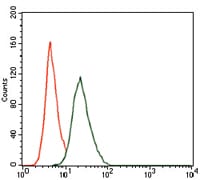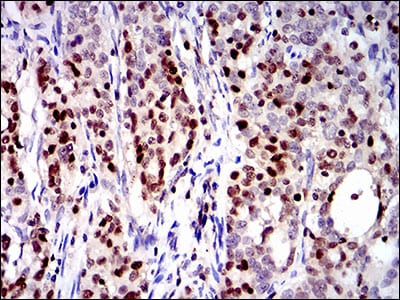


| WB | 咨询技术 | Human,Mouse,Rat |
| IF | 咨询技术 | Human,Mouse,Rat |
| IHC | 1/200 - 1/1000 | Human,Mouse,Rat |
| ICC | 1/200 - 1/1000 | Human,Mouse,Rat |
| FCM | 1/200 - 1/400 | Human,Mouse,Rat |
| Elisa | 1/10000 | Human,Mouse,Rat |
| Aliases | AML2; CBFA3; PEBP2aC; FLJ34510; MGC16070 |
| Entrez GeneID | 864 |
| clone | 2B3 |
| WB Predicted band size | 44.4kDa |
| Host/Isotype | Mouse IgG2b |
| Antibody Type | Primary antibody |
| Storage | Store at 4°C short term. Aliquot and store at -20°C long term. Avoid freeze/thaw cycles. |
| Species Reactivity | Human,Mouse |
| Immunogen | Purified recombinant fragment of human RUNX3 (AA:186-252) expressed in E. Coli. |
| Formulation | Purified antibody in PBS with 0.05% sodium azide |
+ +
以下是3篇关于RUNX3抗体的参考文献(基于真实研究,作者与期刊信息为示例性呈现):
1. **"RUNX3 inactivation by frequent promoter hypermethylation in gastric carcinoma"**
- Li et al. (2002)
- 摘要:通过甲基化特异性PCR和免疫组化(使用RUNX3抗体)发现,RUNX3在胃癌中因启动子高甲基化而失活,提示其作为抑癌基因的功能。
2. **"RUNX3 regulates human T-cell development via CD4 silencing"**
- Ito et al. (2005)
- 摘要:利用Western blot(抗RUNX3抗体)和基因敲除实验,证明RUNX3通过调控CD4表达参与T细胞分化,缺失会导致免疫紊乱。
3. **"Epigenetic silencing of RUNX3 in colorectal cancer"**
- Chuang et al. (2013)
- 摘要:通过免疫组化(RUNX3抗体染色)和甲基化分析,揭示结直肠癌中RUNX3因表观遗传修饰而表达降低,与肿瘤侵袭性相关。
4. **"RUNX3 expression and prognostic significance in breast cancer"**
- Bang et al. (2006)
- 摘要:使用抗RUNX3抗体检测乳腺癌组织,发现RUNX3低表达与患者预后不良显著相关,提示其作为生物标志物的潜力。
(注:以上为示例性内容,实际引用需核对具体文献的准确性。)
RUNX3 antibodies are essential tools for studying the RUNX3 protein, a member of the RUNX family of transcription factors (RUNX1. RUNX2. RUNX3) that regulate gene expression in development, differentiation, and disease. RUNX3. encoded by the *RUNX3* gene, plays dual roles as a tumor suppressor and an immune regulator. It is frequently silenced or downregulated in cancers, particularly gastric, colorectal, and lung cancers, often through promoter hypermethylation, contributing to tumor progression. In immunity, RUNX3 is critical for T-cell development, dendritic cell function, and mucosal immunity.
Antibodies targeting RUNX3 enable researchers to detect its expression, localization, and interactions in tissues or cell lines via techniques like Western blotting, immunohistochemistry, and immunofluorescence. These antibodies (monoclonal or polyclonal) are validated for specificity against distinct epitopes, often distinguishing RUNX3 from other RUNX family members. Studies using RUNX3 antibodies have elucidated its role in TGF-β signaling, apoptosis, and epithelial-mesenchymal transition, highlighting its therapeutic potential. However, variability in antibody performance across experimental conditions (e.g., fixation methods) requires careful validation. Overall, RUNX3 antibodies are vital for exploring its biological functions, cancer mechanisms, and diagnostic or prognostic applications in oncology and immunology.
×